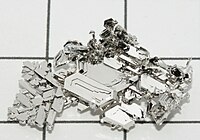
Photo from wikipedia
This paper reports on precise measurements of the non-uniqueness (interpolation errors) associated with using Standard Platinum Resistance Thermometers (SPRTs) in the range from − 196 °C to 100 °C. Six long-stem SPRTs were… Click to show full abstract
This paper reports on precise measurements of the non-uniqueness (interpolation errors) associated with using Standard Platinum Resistance Thermometers (SPRTs) in the range from − 196 °C to 100 °C. Six long-stem SPRTs were compared with unprecedented (< 0.1 m°C) precision in a stirred oil bath from 100 °C down to − 95 °C, with an additional comparison measurement in a bath of liquid nitrogen at − 196 °C. The measurements resulted in a highly self-consistent set of resistance ratios W(t), where W(t) = R(t)/R(0 °C). Selecting the first SPRT as the reference, the differences (Wx − Wref), x = 2 to 6, were calculated, in the manner of the International Temperature Scale of 1990, ITS-90, and then used to investigate the consistency of interpolations between the SPRTs in various temperature ranges. With some minor exceptions, the data suggest that the interpolation consistency (taken to be an upper limit for the Type 3 non-uniqueness between the SPRTs) was ± 0.03 m°C from − 38 °C to 30 °C (representing the mercury-to-gallium subrange in the ITS-90), ± 0.1 m°C from − 95 °C to 80 °C, and ± 0.2 m°C at − 95 °C for interpolations extending from − 196 °C to 0 °C (no data could be taken between − 196 °C and − 95 °C). Various interpolation schemes are investigated, especially to examine ways of avoiding the use of the mercury triple point. One scheme investigated is simply to omit the mercury point and instead to extend the subrange from the argon point up to the gallium point or further, up to 80 °C. Similarly, the ITS-90 subranges to the indium, tin, zinc, or aluminum points could usefully be extended down to the argon point, with suitably adapted interpolation equations. These possibilities remain to be investigated.
Journal Title: International Journal of Thermophysics
Year Published: 2019
Link to full text (if available)
Share on Social Media: Sign Up to like & get
recommendations!